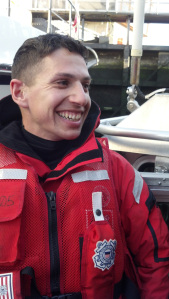 Nicholas Bradford describes himself as a lifelong student of conflict and education at his new blog, "Restorative Justice – in the Puget Sound". In a post from November 8, titled "Restorative Justice in the Coast Guard?? Really? Yes, really!!" Bradford describes a situations in which a "physical altercation resulted from continued verbal sarcasm/jokes (harassment)." The normal discipline procedure would involve formally documenting the case. "If this were a serious offense the members could have been 'Masted,'" writes Bradford, "which is a formal hearing by the CO [commanding officer]. There are no lawyers or burden of proof (similar to principal’s freedom). The members could be confined to the base, they could be sanctioned pay, and/or they could be demoted.
Nicholas Bradford describes himself as a lifelong student of conflict and education at his new blog, "Restorative Justice – in the Puget Sound". In a post from November 8, titled "Restorative Justice in the Coast Guard?? Really? Yes, really!!" Bradford describes a situations in which a "physical altercation resulted from continued verbal sarcasm/jokes (harassment)." The normal discipline procedure would involve formally documenting the case. "If this were a serious offense the members could have been 'Masted,'" writes Bradford, "which is a formal hearing by the CO [commanding officer]. There are no lawyers or burden of proof (similar to principal’s freedom). The members could be confined to the base, they could be sanctioned pay, and/or they could be demoted.
In this situation, however, the CO, "After having several conversations with his staff and the members involved, both those in the altercation and the members who witnessed it, he assigned an apology letter and a learning opportunity to the members." The letters they wrote focused on the harassment policy and the impact their actions had on the junior shipmate who witnessed and reported the incident.
Then Bradford writes, "What I find remarkable is the next step. The Commanding Officer asked both members to read their work in front of the whole Station."
Bradford said this provided an opportunity for those involved to publicly reflect on their actions. He writes:
"Violence is never between just two individuals[;] it affects the greater community. The forethought of the CO in 'airing the dirty laundry' creates an atmosphere of not only accountability but one of support. The reflection on the Harassment policy was shared with everyone. The apology for the negative impact of harassment on junior member and everyone was shared. These experience weren’t shared by the CO… they were shared by peers."
Bradford posts links to both apology letters, which can be found here and here. The sincerity of these apologies is striking. One letter begins:
Until recently I was thoroughly convinced that I had done nothing wrong [...] regarding the known incident. Everyone in the military knows joking/teasing is common place. It has been so common that I have seen superiors joking to all ranks and rates. But for me the difference is that I habitually crossed the line. After a lot of time to think about my actions I realized that not only what I was doing was wrong, but that my audience had one of my subordinates. Knowing now that I acted like a school boy bully I am ashamed that my fireman [junior member] had to witness a lack of leadership, respect and judgment.
I would like to apologize to the engineering department of Section 1. It might sound a bit cliché, but the simple fact of the matter is I had an utter lack of respect for your shop. ... No junior person should ever have to witness such childish behavior from anyone, least of all someone of my seniority and time in service. I applaud the fact that junior personnel have the guts to approach the XO [commanding officer] with the situation when the petty officers did not. That’s a leadership and maturity move and I have to respect that. [original emphasis]
As I reflect upon this blog post, I find myself fascinated by the efforts of the commanding officer to ask those involved in the incident to consider the impact on others, and also to share their views among the entire station rather than adopt a purely punitive approach to addressing the wrongdoing. I might note that an even more inclusive approach might also have provided an opportunity to those affected to give feedback themselves about the impact the incident had on them. In Paul McCold's terms, this is one of the key differences between "partly restorative" and "fully restorative" processes.
